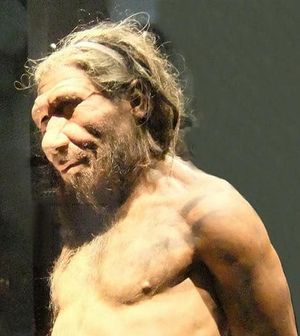Ever since Neanderthal bones were first discovered in Germany, the identity of Neanderthal Man has been a puzzle. Rather inconveniently for evolutionary theories, Neanderthals had average brain sizes somewhat larger than modern man. Despite this, they have been consistently represented as less than human. Early portrayals made them out to be hairy and ape-like: the archetypal ape-man.
In December 2000 Channel 4 broadcast two programmes that set out to present contemporary thinking on the Neanderthals (with additional support from a website and book). Have they solved the puzzles for us? Is the place of Neanderthals in the story of mankind now understood?
Some aspects of the programmes are to be commended. Neanderthals were described as a strong, intelligent and highly adapted species. They were said to be the first human species specifically adapted to a cold climate. They could make fire, and they used it in the preparation of food. They cared for their sick and elderly, and buried their dead, sometimes with accompanying grave goods. The finding of the remains of a Neanderthal/modern hybrid in Portugal is strong evidence of interbreeding and of the full humanity of the Neanderthals.
In the programmes, the Neanderthals were presented as speaking (a welcome revision of earlier thinking – for many years this ability was considered beyond them!). Nevertheless, the presumption of the producers was still that their speech was primitive and sub-human. Viewers were not told that this portrayal of speech limitations was based solely on an evolutionary model of human origins.
The most serious anomalies were in the presentation of the Neanderthals’ behaviour as sub-human. The people seemed slow and lacking in co-ordination. They were portrayed as constructing stone tools in an amateurish way – as though it were a matter of luck that they obtained a sharp edge to use!
Anomalies
Viewers were informed that Neanderthals spent hours of each day grooming each other and that this was to reinforce clan bonding. This behaviour, of course, cannot be known from the archaeological remains. Many viewers would find an implicit association of ideas with this and the grooming practices of great apes.
The most blatant ‘animal’ reconstruction related to the mating scene involving a modern man and a Neanderthal woman. It was turned into a ritualised event during which the woman carried on eating and displayed no emotion. With these subtle visual images, derived entirely from evolutionary presuppositions, the message came over clearly that Neanderthals are not to be regarded as true humans.
Biblical perspective
By contrast, the data that we do have points to Neanderthals as genuine humans. From the biblical perspective of history, this particular race of mankind should be traced back ultimately to Adam and Eve. They do show signs of being culturally degenerate – a situation analogous to some human tribal groups today. Nevertheless, just as for the latter, cultural degeneracy is not a valid reason for denying their humanity.
Locating Neanderthals in the biblical framework of history is not that difficult to do. There is no evidence for an anthropologically universal deluge after the Neanderthals, so they must have lived post-Flood. Neanderthals probably lived in the span of time between the Noachian Deluge and the dispersal of people from the Tower of Babel. We infer that some of the descendants of Noah did not stay with the majority, but wandered off to live as hunter/gatherer tribes in other parts of the wild and inhospitable Earth.
This alternative perspective on Neanderthals contrasts with the prevailing evolutionary model used by large sections of the scientific community. It raises additional questions regarding the validity of the chronological clocks that are used to assign time-scales. However, its merits are that it does justice to all the data (biblical and archaeological) and it effectively answers many contemporary questions surrounding these unusual people.




